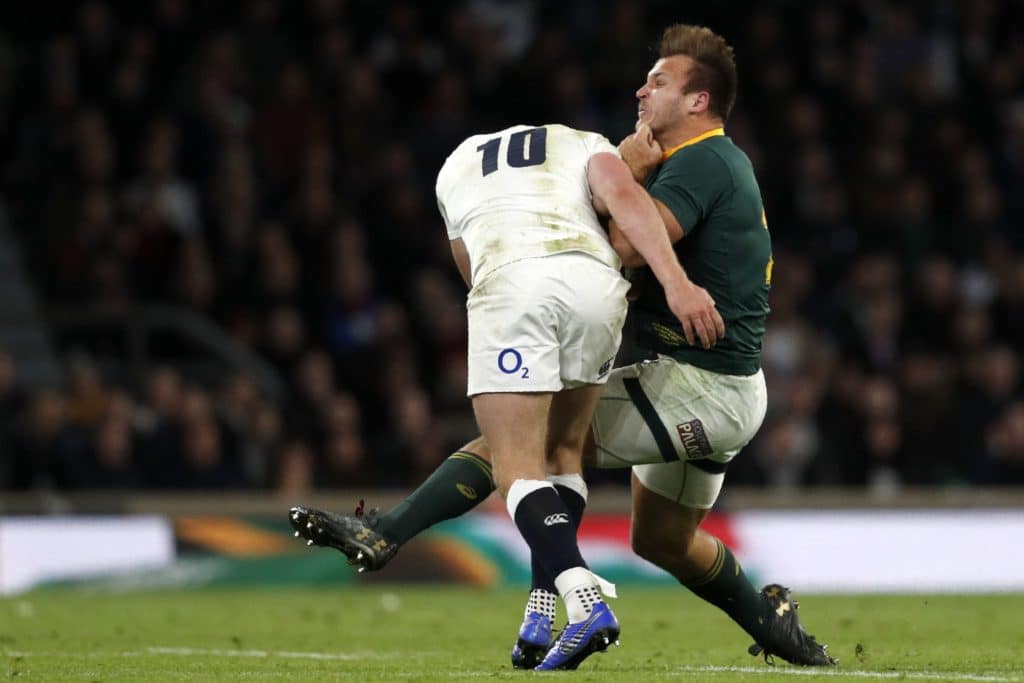Too many contests are being ruined by a referee’s decisions – and in some instances, his refusal to take appropriate action – in the dying moments, writes JON CARDINELLI.
As rugby fans, we want to believe that the game is fair and that those in charge – be they referees, administrators or lawmakers – are capable of making the right decisions more often than not. We want to believe that the integrity of the sport is more important than whether Team A or Team B wins on any given Saturday.
What transpired in the Test played at Eden Park in the 2013 Rugby Championship was a low point for the game. Bismarck du Plessis hammered Dan Carter in a tackle – a fair hit, as Carter himself said later. Referee Romain Poite, however, opted to card Du Plessis and the decision ultimately contributed to the hooker’s ejection and the Boks finishing the game with 14 men.
Would the Boks have won if Du Plessis had stayed on the park, or would the All Blacks have shifted gear – as they so often do – in the dying stages to secure victory?
I remember the atmosphere in the Eden Park press box at that point. The consensus was that such questions were irrelevant. South African and New Zealand reporters were in agreement that the fans at Eden Park and around the world had been done a disservice and that such game-wrecking calls were a black eye for the sport.
REPORT: England punish blundering Boks
Referees need to be brave enough to make the big calls. Foul play should be punished accordingly. The officials need to be certain, though, before doling out punishment for what they perceive to be serious rugby crimes.
The current system allows for the man in the middle to consult with his assistants and the TMO. One would expect the officials, who have all that technology at their disposal, to come to the right decision.
What happened at Eden Park in 2013 was an embarrassment. There was a subsequent admission by World Rugby that Poite had got it wrong, and the card was later expunged from Du Plessis’ record.
It didn’t change the fact that the Boks lost, though. More importantly, it didn’t change the fact that the contest – or more specifically the game of the season – was destroyed for no good reason.
I don’t think anybody will remember the clash at Twickenham this past Saturday as the game of the 2018 season. England were hanging on by their fingernails for much of the contest. The Boks, with their lineout gaffes and game-management maladies, were never in control.
The performance of the two teams was overshadowed by Angus Gardner’s injury-time call, though. Owen Farrell clattered into André Esterhuizen, and television replays confirmed that the England flyhalf had turned his head away, dropped his arms and buried his shoulder into the Bok centre’s chest. The offence warranted, at the very least, a penalty.
WATCH: Farrell’s tackle on Esterhuizen
After consulting with the TMO, however, Gardner decided that Farrell had attempted to wrap his arms around the ball-carrier and that no sanction was warranted. Satisfied with that explanation, Gardner blew the final whistle.
It didn’t take long for journalists on both sides of the England-South Africa divide as well as fans on social media to ask what such a decision says about the standard of officiating and the integrity of the game.
Facebook and Twitter were inundated with stills and clips of Farrell digging his shoulder into the chest of Esterhuizen and making no attempt to wrap his right arm around the ball-carrier. If the amateurs out there can identify a transgression and frame it in a matter of seconds, why can’t the professionals?
World Rugby is trying to clamp down on dangerous tackles. The organisation has instructed referees to deal with offenders severely. How do we find ourselves in a situation where a player is being let off for a clear shoulder charge in a Test match that is being broadcast around the world?
Why should it matter whether the offence was committed in the first minute or well into injury time? Surely a transgression such as this deserves standard punishment.
It shouldn’t concern the referee whether an ensuing penalty will influence the outcome of the game or not. At the end of the day, the referee’s job is – or should be – to maintain the integrity of the contest. Whether the game has gone soft or not is a different debate – there has to be some consistency in the application of the law.
With this in mind, it was disappointing to see some praising Gardner for his failure to act. Former British & Irish Lions centre Brian O’Driscoll suggested that a game ‘is reffed differently’ in the dying moments and that Gardner had got it right. He said that that incident shouldn’t have decided the result.
What does O’Driscoll’s statement say about the state of the game? Are referees less likely to penalise a side at the end of a tight encounter, simply because they don’t want the result to hinge on an official’s decision?
Nigel Owens didn’t cop nearly enough criticism for his performance towards the end of the recent Test between the All Blacks and Boks in Wellington. The Boks emerged victorious, but there was a moment at the death when Kieran Read flew into the side of a ruck and made contact with the head of Francois Louw. Going by the new laws, it was a serious offence and a straight penalty may have been deemed a let-off.
Owens, who appeared to be staring directly at that ruck, failed to acknowledge the transgression with so much as a penalty. The game had reached the point where one penalty would end the contest, and perhaps that influenced his thinking.
The Boks hung on for the win, and there may have been hell to pay – at least on social media – if they had not. Again, one has to ask why referees are so reluctant to make a call in that situation. Why is a knock-on easier to call than a foul-play transgression?
How will this approach by top officials shape coach and player attitudes in the buildup to the World Cup?
This past Saturday, we saw England taking more chances at the death. They shot up off the line to stop the Boks from gaining momentum in their 22. The referee was more forgiving of their offside transgressions, because, as O’Driscoll suggests, a game is managed differently at the death.
Will we see more players throwing themselves into the rucks as recklessly as Read did in Wellington? Will we see defenders putting their bodies on the line like Farrell did in London, with an emphasis on physicality rather than accuracy?
World Rugby needs to stamp this behaviour out if it is truly serious about player safety. It also needs to push referees to manage the game consistently over 80 minutes. Officials cannot allow a possible result to influence their decision-making process at the death.
VOTE NOW: 2018 Fans’ Choice Awards
Photo: Adrian Dennis/AFP Photo





